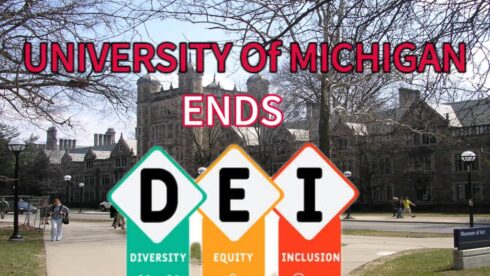The University of Michigan (U-M) has officially concluded its Diversity, Equity, and Inclusion (DEI) initiative, marking a paradigm shift in the university’s policies. Launched in 2016 as part of a long-term strategy to foster an inclusive campus, the DEI initiative was renewed in 2021 under the DEI 2.0 framework. However, U-M leadership has now decided to discontinue the program, citing evolving institutional priorities and the need for a broader approach to campus diversity.
The University of Michigan’s decision comes amid growing debates on the effectiveness and financial sustainability of DEI efforts in higher education. With the program’s termination, the university is expected to reassess how it supports underrepresented student populations, faculty hiring practices, and curriculum inclusivity. While some view this move as a necessary recalibration, others argue that it could undermine years of progress toward campus equity.
University of Michigan Responds to Political and Legal Pressures on DEI Policies
The University of Michigan has long been at the center of legal and political battles over race-conscious policies. Michigan voters banned race-based affirmative action in 2006, restricting the university’s ability to use race as a factor in admissions. The recent U.S. Supreme Court ruling against affirmative action further complicated the university’s diversity efforts, prompting a reassessment of DEI strategies.
The University of Michigan’s decision aligns with a growing national trend where public universities face increasing scrutiny over diversity initiatives. Conservative-led states, such as Texas and Florida, have passed legislation limiting DEI programs, arguing that they promote division rather than inclusion. As legal challenges continue to shape university policies, U-M’s move may serve as a precedent for other institutions reconsidering their diversity frameworks.
University of Michigan Redirects DEI Funding to Academic and Institutional Goals
The University of Michigan has indicated that financial considerations played a role in the decision to phase out its DEI initiative. Over the years, the university allocated millions of dollars to DEI-related programs, hiring specialized administrators, and implementing training workshops. Critics of the initiative argued that these funds could be redirected to academic programs, research, and student scholarships.
The U-M’s financial reallocation strategy will shift resources toward broader institutional goals, including student success programs, faculty recruitment, and research expansion. While university officials emphasize that inclusion remains a priority, some faculty and student groups worry that the absence of a formal DEI framework could weaken institutional commitments to diversity. The coming months will reveal how effectively the university adapts its policies while maintaining campus inclusivity.
University of Michigan Faces Mixed Reactions from Faculty, Students, and Alumni
The University of Michigan has encountered diverse reactions to the discontinuation of its DEI initiative. Supporters of the decision argue that diversity should be encouraged through organic cultural shifts rather than administrative mandates. They believe the university’s focus should be on academic excellence, student achievement, and merit-based admissions.
The University of Michigan’s student body, however, has expressed concerns over the long-term impact of this decision. Organizations such as the Black Student Union and Latinx Student Association have voiced opposition, stating that the DEI initiative provided vital support structures for minority students. Protests and petitions calling for alternative inclusion measures are gaining traction, highlighting the ongoing debate over equity in higher education.
University of Michigan Reimagines Its Approach to Campus Diversity
The University of Michigan now faces the challenge of maintaining an inclusive campus environment without a dedicated DEI program. University officials have suggested that future efforts may focus on socioeconomic diversity, first-generation student support, and broader accessibility initiatives rather than race-based policies.
The University of Michigan’s new direction reflects a broader shift in higher education, where universities are reassessing how they foster diversity while complying with legal and political constraints. Whether this shift leads to more effective inclusion strategies or a rollback of diversity efforts remains to be seen. The university’s ability to balance academic excellence with representation will be closely scrutinized in the years ahead.
University of Michigan’s Decision Sparks National and Industry-Wide Debate
The University of Michigan’s move to discontinue DEI programs is expected to have far-reaching consequences beyond campus borders. As other universities face similar challenges, many are likely to evaluate whether to follow Michigan’s lead or double down on existing diversity efforts.
The U-M’s decision may also influence corporate partnerships and talent pipelines, as many companies have relied on university DEI programs to foster a diverse workforce. The national conversation surrounding equity, academic freedom, and institutional responsibility is intensifying, with U-M’s policy shift emerging as a defining moment in the future of diversity initiatives in American education.














